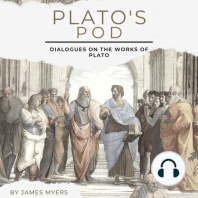120 min listen

Dialogue on The Cratylus, Part 1: Distinguishing One Thing From Another
Dialogue on The Cratylus, Part 1: Distinguishing One Thing From Another
ratings:
Length:
94 minutes
Released:
Nov 7, 2022
Format:
Podcast episode
Description
The focus of Plato's dialogue the Cratylus is the origin and use of names applied to things, and our understanding of their meaning in complex ideas exchanged by language. On October 30, 2022 members of the Toronto, Calgary, and Chicago Philosophy Meetup groups began by examining the meaning of the word "thing" as an "object of thought", to establish the very broad and crucial scope of Plato's work in the context of our perception. We debated whether words originate in nature or by human convention, and whether rules are set and supervised in the establishment of names. The question may be of great importance now that our technology is gaining the power to simulate human language. At the end of our discussion we began to consider whether "man is the measure of things" and if that is the case how wisdom would be distinguished from foolishness, as Socrates asks. It's a question we will pick up on at the beginning of our second episode on the Cratylus.
Released:
Nov 7, 2022
Format:
Podcast episode
Titles in the series (59)
Dialogue on The Phaedrus (Part II): The Purpose of Speech, and its Powers in Particular by Plato's Pod: Dialogues on the works of Plato